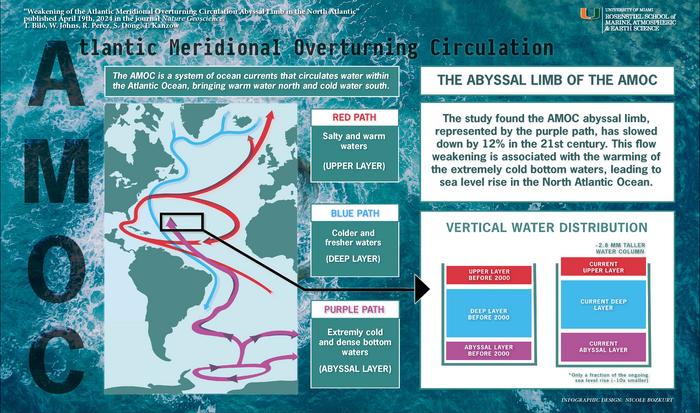Analysis of mooring observations and hydrographic data suggest the Atlantic Meridional Overturning Circulation deep water limb in the North Atlantic has weakened. Two decades of continual observations provide a greater understanding of the Earth’s climate regulating system.

Credit: Nicole Bozkurt, University of Miami Rosenstiel School of Marine, Atmospheric, and Earth Science.
Analysis of mooring observations and hydrographic data suggest the Atlantic Meridional Overturning Circulation deep water limb in the North Atlantic has weakened. Two decades of continual observations provide a greater understanding of the Earth’s climate regulating system.
A new study published in the journal Nature Geoscience led by scientists at University of Miami Rosenstiel School of Marine, Atmospheric, and Earth Science, and the National Oceanic and Atmospheric Administration’s Atlantic Oceanographic and Meteorological Laboratory, found that human-induced environmental changes around Antarctica are contributing to sea level rise in the North Atlantic.
The research team analyzed two decades of deep sea oceanographic data collected by observational mooring programs to show that a critical piece of Earth’s global system of ocean currents in the North Atlantic has weakened by about 12 percent over the past two decades.
“Although these regions are tens of thousands of miles away from each other and abyssal areas are a few miles below the ocean surface, our results reinforce the notion that even the most remote areas of the world’s oceans are not untouched by human activity,” said the study’s lead author Tiago Biló, an assistant scientist at the Rosenstiel School’s NOAA Cooperative Institute for Marine and Atmospheric Studies.
As part of the NOAA-funded project DeepT (Innovative analysis of deep and abyssal temperatures from bottom-moored instrument), the scientists analyzed data from several observational programs to study changes over time in a cold, dense, and deep water mass located at depths greater than 4,000 meters (2.5 miles) below the ocean surface that flow from the Southern Ocean northward and eventually upwells to shallower depths in other parts of the global ocean such as the North Atlantic.
This shrinking deep-ocean branch — that scientists call the abyssal limb – is part of the Atlantic Meridional Overturning Circulation (AMOC), a three-dimensional system of ocean currents that act as a “conveyer belt” to distribute heat, nutrients, and carbon dioxide across the world’s oceans.
This near-bottom branch is comprised of Antarctic bottom water, which forms from the cooling of seawater in the Southern Ocean around Antarctica during winter months. Among the different formation mechanisms of this bottom water, perhaps the most important is the so-called brine rejection, a process that occurs when salty water freezes. As sea ice forms, it releases salt into the surrounding water, increasing its density. This dense water sinks to the ocean floor, creating a cold, dense water layer that spreads northward to fill all three ocean basins – the Indian, Pacific, and Atlantic oceans. During the 21st century, the researchers observed that the flow of this Antarctic layer across 16°N latitude in the Atlantic had slowed down, reducing the inflow of cold waters to higher latitudes, and leading to warming of waters in the deep ocean.
“The areas affected by this warming spans thousands of miles in the north-south and east-west directions between 4,000- and 6,000-meters of depth,” said William Johns, a co-author and professor of ocean sciences at the Rosenstiel School. “As a result, there is a significant increase in the abyssal ocean heat content, contributing to local sea level rise due to the thermal expansion of the water.”
“Our observational analysis matches what the numerical models have predicted—human activity could potentially impose circulation changes on the entire ocean,” said Biló. “This analysis was only possible because of the decades of collective planning and efforts by multiple oceanographic institutions worldwide.”
The study, titled “Weakening of the Atlantic Meridional Overturning Circulation Abyssal Limb in the North Atlantic,” was published in the April 19 issue of the journal Nature Geoscience. The study’s authors include: Tiago Biló, William Johns from the Rosenstiel School; Renellys Perez and Shenfu Dong from NOAA’s Atlantic Oceanographic and Meteorological Laboratory, and Torsten Kanzow from the Alfred-Wegener-Institute Helmholtz Center for Polar and Marine Research in Germany.
The research was supported by NOAA’s Global Ocean Monitoring and Observing program (100007298); NOAA’s Climate Program Office, Climate Observations and Monitoring, and Climate Variability and Predictability programs (NOFO NOAA-OAR-CPO-2021-2006389), U.S. National Science Foundation (grants OCE-1332978 and OCE-1926008), the European Union’s Horizon 2020 Research and Innovation Program (grant 821001 (SO-CHIC), and the Deutsche Forschungsgemeinschaft German Research Foundation project number 274762653), with additional NOAA Atlantic Oceanographic and Meteorological Laboratory support.
About the University of Miami
The University of Miami is a private research university and academic health system with a distinct geographic capacity to connect institutions, individuals, and ideas across the hemisphere and around the world. The University’s vibrant and diverse academic community comprises 12 schools and colleges serving more than 17,000 undergraduate and graduate students in more than 180 majors and programs. Located within one of the most dynamic and multicultural cities in the world, the University is building new bridges across geographic, cultural, and intellectual borders, bringing a passion for scholarly excellence, a spirit of innovation, a respect for including and elevating diverse voices, and a commitment to tackling the challenges facing our world. Founded in the 1940’s, the Rosenstiel School of Marine, Atmospheric, and Earth Science has grown into one of the world’s premier marine and atmospheric research institutions. Offering dynamic interdisciplinary academics, the Rosenstiel School is dedicated to helping communities to better understand the planet, participating in the establishment of environmental policies, and aiding in the improvement of society and quality of life. www.earth.miami.edu.
Journal
Nature Geoscience
Method of Research
Data/statistical analysis
Article Title
Weakening of the Atlantic Meridional Overturning Circulation Abyssal Limb in the North Atlantic
Article Publication Date
19-Apr-2024
COI Statement
none



